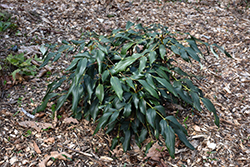It's all about ...
plants

Height: 5 feet
Spread: 5 feet
Sunlight:
![]()
![]()
Hardiness Zone: 8a
Other Names: Grape Holly, Oregon Grape
Description:
An interesting mounded shrub with leathery, glossy dark green leaves with few spines; showy mauve-lilac flowers in spring and attractive blue-black fruit in late summer; somewhat fussy, needs moist acid soils, some shade and protection from winter winds
Ornamental Features
Chinese Mahonia is primarily grown for its highly ornamental fruit. It features an abundance of magnificent steel blue berries with black overtones from mid fall to mid winter. It features showy racemes of rose flowers with lilac purple overtones and yellow centers rising above the foliage from mid summer to mid fall. It has dark green evergreen foliage. The spiny oval pinnately compound leaves turn an outstanding red in the fall, which persists throughout the winter.
Landscape Attributes
Chinese Mahonia is an open multi-stemmed evergreen shrub with an upright spreading habit of growth. Its average texture blends into the landscape, but can be balanced by one or two finer or coarser trees or shrubs for an effective composition.
This shrub will require occasional maintenance and upkeep, and can be pruned at anytime. Deer don't particularly care for this plant and will usually leave it alone in favor of tastier treats. Gardeners should be aware of the following characteristic(s) that may warrant special consideration;
- Suckering
Chinese Mahonia is recommended for the following landscape applications;
- Mass Planting
- Hedges/Screening
- General Garden Use
- Naturalizing And Woodland Gardens
Planting & Growing
Chinese Mahonia will grow to be about 5 feet tall at maturity, with a spread of 5 feet. It tends to fill out right to the ground and therefore doesn't necessarily require facer plants in front, and is suitable for planting under power lines. It grows at a slow rate, and under ideal conditions can be expected to live for approximately 30 years. While it is considered to be somewhat self-pollinating, it tends to set heavier quantities of fruit with a different variety of the same species growing nearby.
This shrub does best in partial shade to shade. It prefers to grow in average to moist conditions, and shouldn't be allowed to dry out. It is not particular as to soil type, but has a definite preference for acidic soils, and is subject to chlorosis (yellowing) of the foliage in alkaline soils. It is somewhat tolerant of urban pollution, and will benefit from being planted in a relatively sheltered location. Consider applying a thick mulch around the root zone in winter to protect it in exposed locations or colder microclimates. This species is not originally from North America.
This plant is not reliably hardy in our region, and certain restrictions may apply; contact the store for more information.
